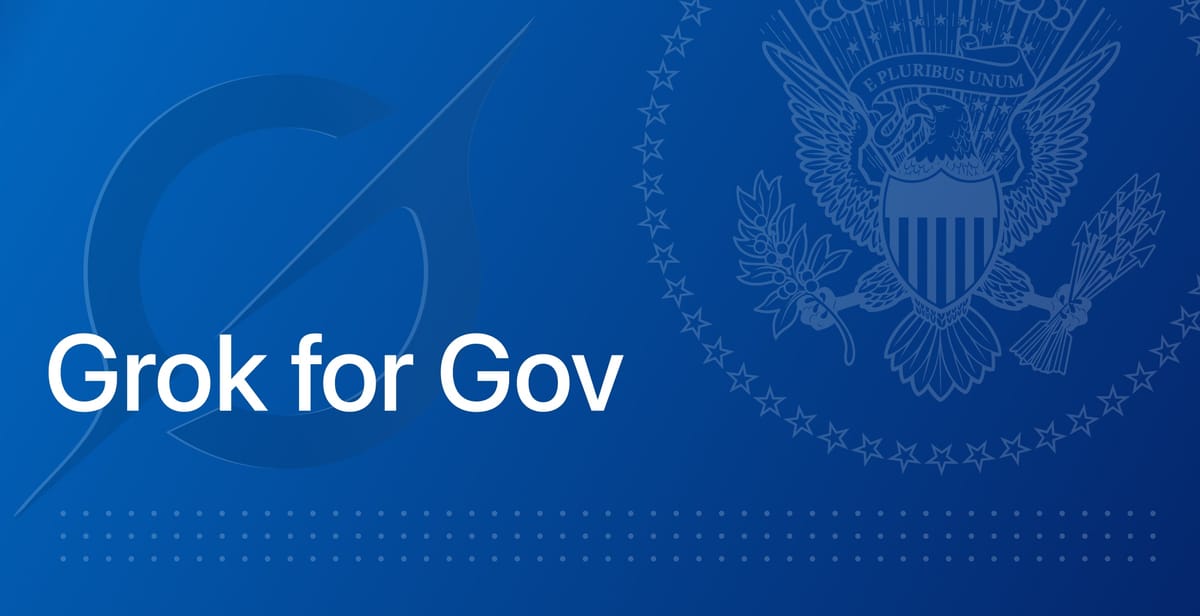Elon Musk's xAI just landed a major government payday. The company announced Grok for Government on Monday, a new suite of AI products specifically designed for U.S. federal agencies, complete with a $200 million ceiling contract from the Department of Defense.
Key Points:
- xAI secured a $200M DoD contract alongside GSA schedule access, making Grok available to any federal agency
- Part of broader AI government push - OpenAI, Anthropic, and Google all got similar $200M contracts from Pentagon
- Grok 4 powers the offering - xAI's latest model that claims to outperform rivals on key benchmarks
The announcement puts xAI squarely in the middle of Silicon Valley's latest gold rush: selling AI tools to the government. What started as a taboo for many tech companies has become a billion-dollar opportunity as federal agencies scramble to adopt commercial AI solutions.
Announcing Grok for Government - a suite of products that make our frontier models available to United States Government customers
— xAI (@xai) July 14, 2025
We are especially excited about two new partnerships for our US Government partners
1) a new contract from the US Department of Defense
2) our…
xAI's government push centers on two key wins. First, there's the $200 million contract with the Pentagon's Chief Digital and Artificial Intelligence Office (CDAO) — the same program that awarded identical contracts to OpenAI, Anthropic, and Google. Second, and perhaps more importantly, xAI products are now available through the General Services Administration (GSA) schedule, the government's streamlined procurement system that lets any federal agency purchase approved products without lengthy bidding processes.
"This allows every federal government department, agency, or office, to purchase xAI products," the company noted in its announcement. That's a big deal. The GSA schedule essentially transforms xAI from a niche AI startup into an approved government vendor that can sell to anyone from the Department of Veterans Affairs to local Social Security offices.
The Defense Department's announcement of these AI contracts signals a coordinated effort to bring commercial AI capabilities into government operations. According to CDAO Chief Dr. Doug Matty, the goal is to help agencies "leverage the technology and talent of U.S. frontier AI companies to develop agentic AI workflows across a variety of mission areas."
For xAI, this represents remarkable progress. The company was founded just two years ago by Musk after he left OpenAI's board, positioning itself as an alternative to what he viewed as overly "woke" AI systems. Now Grok — named after the science fiction term for deep understanding — is heading to federal offices alongside the very competitors Musk set out to challenge.
The company is promising government customers access to its latest Grok 4 model, which xAI claims beats rivals on various benchmarks. Government agencies will also get access to features like Deep Search for comprehensive information gathering and tool integration capabilities. More importantly, xAI says it will offer "custom models for national security and critical science applications" and deploy engineers with government security clearances.
This government embrace reflects a broader shift in Silicon Valley's relationship with defense work. Companies that once avoided military contracts are now actively pursuing them. OpenAI removed its ban on military applications last year and launched "OpenAI for Government." Anthropic partnered with Palantir to bring its Claude AI to intelligence agencies. Even Meta changed its policies to allow military use of its Llama models.
The war in Ukraine and rising competition with China have made defense tech more socially acceptable in Silicon Valley circles. But there's also a simpler motivation: money. With AI companies burning through billions in development costs, government contracts offer a steady revenue stream and validation of their technology.
For xAI specifically, the government contracts come at a crucial time. The company just raised $6 billion in December and is valued at $80 billion, but it's still competing against well-established rivals with deeper pockets and more mature products. Government endorsement could help legitimize Grok in the broader market.

